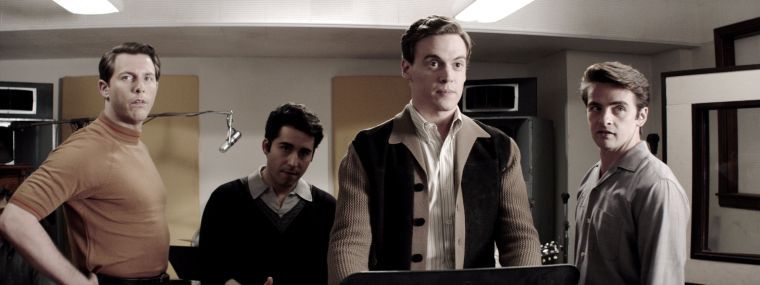‘Jersey Boys’ a gloomier look at The Four Seasons’ rise to fame
July 8, 2014
“Jersey Boys”
Starring: John Lloyd Young, Erich Bergen and Michael Lomenda
Directed by: Clint Eastwood
Grade: B
Frankie Valli (John Lloyd Young) once said he’d be bigger than Sinatra — big words for a young boy from working-class New Jersey. For a while, he was a sensation, but it was a bumpy road to the top, as detailed in Clint Eastwood’s “Jersey Boys.”
Eastwood’s much-anticipated film adaptation of the popular Broadway musical tells the tale of how Valli and his band, The Four Seasons, came close to Sinatra’s level of fame. Once again, the famed director and actor, now 84, shows his uncanny knack for bringing a bit of darkness into a story by showing how fame always comes at a price.
Valli lives a life in the spotlight from a very young age and, although he sings a few smash hits (“Sherry,” “Big Girls Don’t Cry,” “Walk Like a Man,” “Working My Way Back to You” and others featured in the film), his fame causes many problems in his personal life.
His marriage to Mary Delgado (Renee Marino) — a “type A” dame, as an underhanded Tommy DeVito (Vincent Piazza) warns the burgeoning young singer — dissolves. Later on in the film, Valli’s deadbeat ways prompts the rebellion and, eventually, the death of his young daughter Francine.
“Jersey Boys” is fast-paced as we watch members of The Four Seasons face many dilemmas throughout their careers. Whether it’s guitarist DeVito causing the band financial trouble or Valli dealing with personal issues, Eastwood keeps tension high.
Despite Eastwood’s finesse with drama, the film falls short of being a bona fide movie-musical. The use of narration by the four separate band members is ideal, but DeVito is granted a disproportionate amount of attention. It would be nice to hear more of Bob Gaudio’s (Erich Bergen) side of the story, since the songwriter and keyboardist was the most articulate, inventive member of the group.
DeVito’s charisma, street smarts and Italian accent make him the star of the show and you’d never guess that Piazza was the only Four Seasons cast member who hadn’t starred in the musical on Broadway.
Young certainly looks the part but disappointingly makes Valli seem like too much of a pushover, especially in the early stages of the film. Valli, who still seems to have some baby fat, finally stands up to DeVito later in the film after a group disagreement over the band’s finances.
But Young’s falsetto, far from brittle, has strong variety in tone color, and he especially nails the high vocal run at the beginning of “Walk Like A Man.” It’s an impressive feat, as the tracks were recorded live on set — following in the footsteps of 2012’s “Les Miserables.”
The most head-scratching performance came from Michael Lomenda, who played Four Seasons bassist Nick Massi. Massi admits at the end of the film that he was the “Ringo” of the group — and Lomenda looks out of place with the group throughout the film. Aside from his gangly stature, his corny bass vocals are awkward in a ‘60s pop singing group. His vocal delivery in the performance of “Sherry” look and sound downright goofy — perhaps even more funny than Joe Pesci (Joseph Russo, as the real-life Joe Pesci) borrowing a line from “Goodfellas,” 30 years before the movie’s release, as he introduces Gaudio to the group.
Eastwood certainly had his work cut out for him as he faced the daunting task of lining up his storyline with both the true story of The Four Seasons and the Tony Award-winning musical, which is the 13th longest-running show on Broadway.
In his search for tragedy, Eastwood delves deeper than the musical with the inclusion of Valli’s daughter and her tragic death from a drug overdose — the same daughter Valli sings to sleep earlier in the film with a soft, solo rendition of “My Eyes Adored You.” His daughter Francine (portrayed by four different actresses in the film) hardly appears in the Broadway musical.
While Eastwood may not always nail the musical elements of “Jersey Boys,” at least he injects some of his trademark gloom and tragedy into the sunny ‘60s pop rock.








